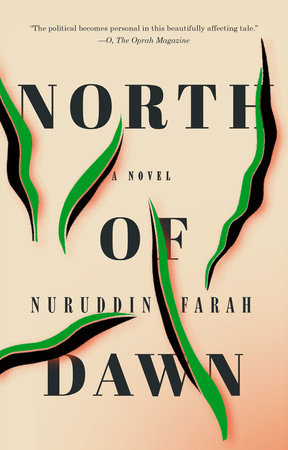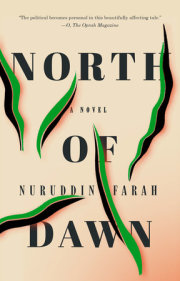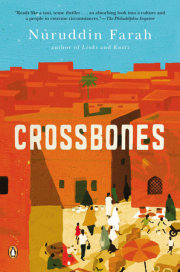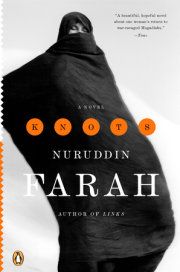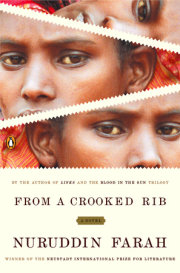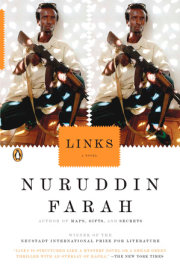Chapter One
Gacalo wages an unrelenting campaign for several months, hoping that Mugdi will not stand in the way of Dhaqaneh's widow, Waliya, and his two stepchildren joining them in Oslo. Knowing Gacalo, she will not hesitate to recruit the support of their daughter Timiro, visiting from her home in Geneva; Kaluun, Mugdi's younger brother; their Norwegian friends Johan and Birgitta Nielsen; and Himmo, a Somali woman residing in Oslo whom Gacalo and Mugdi have grown close to and who is of the view that Gacalo should continue supporting the widow and her two children where they are, in Kenya. But Gacalo is adamant that she will not give up until Mugdi and everyone else accedes to her demand.
Inflexible, Mugdi repeatedly asks, "Why would I sponsor the wife of a son whom I forsook first and then denounced as a terrorist?"
A former ambassador in Somalia's Ministry of Foreign Affairs just before the collapse of the state structures, Mugdi is used to having his own way. It is no secret that it irritates him to see people opposing him when their rationale does not sit well with his reasoning.
The longer the standoff lasts and Gacalo makes it obvious that she won't settle for anything less than Mugdi's full public endorsement of her plan, the more everyone becomes concerned. Gacalo's inability to convince Mugdi to share her vision upsets her so much that she feels diminished, unloved, to the point that one afternoon, after yet another explosive argument, she storms out of the house, not knowing where she is going.
When she doesn't answer her mobile phone or return home for a long time, Timiro goes out in search of her mother in the two parks close by. Not finding her at either park, she telephones Birgitta, who confirms that Gacalo is with them.
On Timiro's way home from her search, she runs into Himmo, who has just alighted from the tram after a night shift at the hospital where she works as a nurse. Delighted by the chance encounter, the two women decide to find a cafŽ where they might chat for a bit. Timiro explains what has brought her to this area of the city, filling Himmo in on the tension at home with regard to Waliya. She says, "The atmosphere has lately turned so toxic, I can't stand it, and I've told them so. I don't recall my parents ever rowing as much as they've done of late, or of Mum ever raising her voice in anger, except perhaps once, when I was a child."
"Oh? Were you a difficult girl?"
"It was more that I was young and obstinate, and desperately wanted a cat for a pet. Mum put her foot down, as having a pet would interfere with our weekend travels. I went behind her back, pleading with Dad, and he agreed without consulting her and arranged for the pet shop to deliver one. I had never heard her so angry as when she arrived home and saw the cat. In the end, however, Dad won the day and I got to keep it."
"Maybe it is only fair that your mother has her way this time round."
"Perhaps, but you never know with Dad, a man given to changing his mind at the very time you least expect him to."
Himmo says, "I know what you mean. But at his heart, he is such a mild-mannered man, and I feel certain that rather than continuing to disappoint your mum, he will give in."
"I hope so for both their sakes," says Timiro. "Mum broods all the time, is constantly at the office, and when she does return home, lapses into self-isolating silences. She goes to bed soon after dinner, if, that is, she is around to eat with us. She wakes up early and then goes off again. Then Dad retreats into his study to devote more time to the translation he's working on of his favorite Norwegian novel, Giants in the Earth."
Himmo predicts, "Time will come when they will both want to be on each other's good side. Don't worry. They love each other so."
"I just wish they wouldn't spoil my visit."
"Give their anger time to find its own home," says Himmo. "Your dad is incensed she kept a secret line open to Dhaqaneh; she is furious that he disowned the boy. Still, I'm sure he won't stand in the way of the family reunion."
Timiro's mobile phone rings. Answering it, she says in an aside to Himmo, "It's Dad." Then she addresses her words to her father, telling him not to worry, that Mum is with Birgitta, and she is at a café with Himmo, whom she ran into by chance.
The waiter brings them their pot of tea at the very moment when Timiro feels nauseated. She holds her breath and places her hand before her mouth in the manner of someone preparing to vomit. Himmo takes notice of this but keeps her thoughts to herself. Instead, she pours the tea and watches as Timiro brings her cup to her lips then puts it down in silence.
Himmo says, "Enough about your parents' quarrels over Waliya. I want to hear your news. How are you, and how is Xirsi, and where is he?"
Timiro shifts in her seat, and then with a beam of happiness shining in her eyes says, "I'm pregnant."
Himmo stretches out her right hand toward Timiro until their fingers touch. Then she congratulates her, wishing her good health and an uncomplicated delivery, given her age-Timiro will be thirty-four by the time the baby is due. She adds, "Your parents must be happy."
Timiro says, "Not as happy as I hoped."
"No? Why is that?"
"Well, as I've said before, I've flown into a stressful situation, and they're much too preoccupied with their own set-to, to be fully engaged in my condition. I don't completely blame them. After all, Dhaqaneh's death, my mother's promise to him, and whether Waliya is or is not welcome to join the family precede my pregnancy. And besides all that, they're not overly fond of Xirsi."
"So what do you plan to do?" asks Himmo.
"I'll sit them down and tell them that I do not wish to give birth to my baby in a hostile environment."
Himmo says, "I'm sure they'll see sense when you talk to them, and I hope that Xirsi sees sense too, and is able to step up and keep his side of the contract, both as a father to the child and as a husband to you."
"Xirsi is a bad lot and I'm unsure he'll mend his ways and act responsibly toward me or our child," says Timiro. "I know it'll be tough to be a single mother and a professional. But I take courage from women like you. You've done it and done it well."
"It was easier having children back home, with an extended family to assist. Here, in Europe, it has been hard for most of the Somali women, whether they are married or not. Many couples come to a head because the husbands don't put in their fair share in holding the family together; they seem unable or unwilling to play their role, many showing more interest in clan politics, not in raising their young families. This is why women with professional careers have found themselves in impossible situations, with many choosing to divorce. Personally, I salute the mothers that persevere and work tirelessly to put food on the table, look after children, make sure they attend school, stay out of trouble, with little or no help from male partners. I think of these women as the unsung heroines, every single one of them."
"I'm done with Xirsi. I'll divorce him."
In her empathic response to what Timiro has just told her, Himmo's outstretched hand comes into a gentle contact with Timiro's and the two women remain silent for quite a while.
Timiro needs no reminding that Himmo has been married and divorced three times, the men in her life having failed, time and again, to act responsibly toward their offspring, which Himmo is now looking after by herself. Now Himmo says, "Of the men I know, your father is exceptional in this regard."
Timiro is happy to hear Himmo say that, and after a few more minutes of small talk, the two women go their different ways. At home, Timiro finds her father in his study, working on a moving scene of Giants in which the first Norwegian migrants to settle in the Dakota territories meet Native Americans for the first time and are terrified, suspecting that the band of natives will scalp them.
Timiro makes dinner and when her mother has returned, albeit in low spirits, Timiro invites her parents to the table. As they eat in silence, she worries that she cannot sense her parents' togetherness the way she used to; she can only feel their doubts about the future, their fears. Why allow a third party to pull them asunder at the very time when, with their mourning over, they should be showing their connectedness?
So she ambushes them with unexpected news: that she is returning to Geneva as soon as she finds a flight. Gacalo is the first to find her tongue, stammering, "But you said you would be here for a while. You're in no state to be on your own, feeling sick, staying up late, and working."
"I know why she is leaving," says Mugdi.
Gacalo looks from Mugdi to Timiro and back at Mugdi. "Am I missing something? Have the two of you been conspiring?"
"Our daughter is leaving because she can't stand being around when the two of us are fighting to the bitter end, neither of us prepared to allow the other to have his or her way."
"If that's the case, what are you going to do about it?"
"What are we doing about it, Mum," says Timiro. "Remember, this concerns every member of the family, including my unborn baby."
Timiro will forever time the moment her father's resistance buckled to when she used the inclusive pronoun "we," in "What are we going to do about it?" It is true that she has run out of patience with her bickering parents. Still, she feels that her father has put on himself pressure unlike any other, understandably-he will do his best not to allow outsiders to intrude harmfully into their lives during the auspicious period when they are expecting a grandchild. Later, she will claim she knew he would concede to Gacalo when she saw the twinkle of his eyes. As it happens, he acquiesces to all of her mother's dictates: renting a vehicle to fetch them from the airport; taking Waliya and the children to their new home, a three-bedroom apartment Gacalo has obtained for them; and what's more, doing all of this alone, as when the day finally comes that Waliya and her children are to be picked up, Gacalo will announce that she is chairing a meeting that she cannot afford to miss. And so there is nothing left for Mugdi to say but "It'll be a pleasure to welcome them, darling."
How sweet of him!
As Gacalo gathers her papers to leave for the office, she offers Mugdi a multipocketed leather purse heavy with coins.
"What is this? Gold?"
Gacalo replies, "Coins for your parking."
Mugdi has never known Gacalo to be fretful, yet now she is as antsy as a mother hen, clucking protectively at anyone approaching her chicks.
She says, "Will you promise not to ask them any embarrassing questions-not when you first meet them, nor later, when you are in the car on your way to the apartment, where I'll be waiting to welcome them?"
"I won't."
"How I wish he too was coming!"
He says nothing, knowing she is referring to Dhaqaneh. She turns away from him, the well of her eyes filling with tears. Before she departs, she says, her voice moist, "Be sure to call me anyhow."
On the drive to the airport, Mugdi brims over with sadness and not for the first time thinks of himself as a man born to grief, a Somali concerned about the death of a son or the arrival of a widow and her children when he should be sorrowing over the terminal cancer that has infected his nation. He detests Somalia's dysfunction, unrelenting since 1991, the year the country collapsed after its clan politics had gone awry, and Mogadiscio became a killing field.
Mugdi arrived in Norway in 1988, before the start of the strife. Norway was a different country then. The majority of its Muslim population consisted of a homogenous community of Pakistanis, who had come as indentured laborers. Soon after Mugdi's arrival, he learned of a nineteen-year-old Norwegian member of the right-wing National Popular Party who had launched a bomb attack on Nor Mosque in 1985-a forewarning of the attacks that would increase in frequency.
Johan Nielsen, his friend, said at the time, "There's nothing new about this. Nowadays hate groups perceive Muslims as an existential threat to Norway in the same way similar hate groups of old perceived Jews, with contempt and fear."
"Still, it is worrying," said Mugdi.
His wife, Birgitta, went on, "The year before, a prominent Norwegian politician of extreme right-wing persuasion falsely claimed to have received a letter from a Muslim, in which the author forewarned that one day mosques will be as common in Norway as churches are today and that the heathen cross in the flag will be gone."
Mugdi felt so unwelcome and unsafe hearing of such incidents that he even considered returning to Somalia, and perhaps would have, if Gacalo hadn't pleaded with him not to for the sake of the children. Instead, he did what he could for his country from afar, writing articles and editorials in which he advocated for peace among the warring clan militias. Then he joined a group of former Somali ambassadors, politicians, and intellectuals whose aim was to deal with the rupture in Somalia's body politic, to stop the hemorrhage, but to no avail. Still he did not give up, and was soon in New York to provide background documentation for the United Nations Security Council meetings on Somalia. He was traveling constantly and saw less and less of his family. It was during this time that Dhaqaneh began acting out, skipping class until his frequent truancy led the school to threaten his expulsion.
When Mugdi was home, the tension in the household made him edgy and irritable. His sense of failure took the shine off his work for the nation. Frustrated and depressed, he cut himself off from the Somali community, spending more of his time in his study, at the gym, walking in a nearby park, or ensuring that Dhaqaneh was back on the straight and narrow.
Copyright © 2018 by Nuruddin Farah. All rights reserved. No part of this excerpt may be reproduced or reprinted without permission in writing from the publisher.

